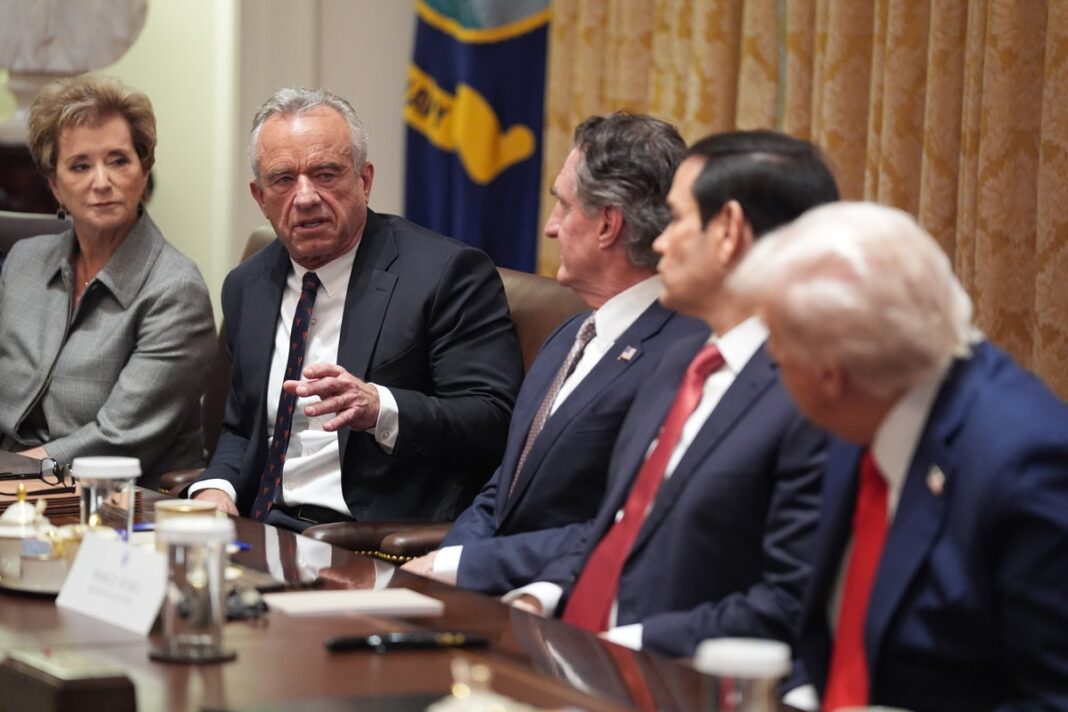The Controversial Remarks of Secretary of Health and Human Services, Robert F. Kennedy Jr.
In a recent cabinet meeting, Robert F. Kennedy Jr., the newly appointed Secretary of Health and Human Services, stirred controversy with his remarks linking common over-the-counter medication and certain social practices to autism. This unexpected turn of events left several Republican senators scratching their heads, highlighting the growing tension surrounding scientifically unfounded theories and public health.
Baffling Claims on Acetaminophen and Autism
During the meeting, Kennedy recounted a TikTok video featuring a pregnant woman taking Tylenol, questioning its implications for fetal health. He boldly claimed that taking acetaminophen might be linked to autism, although no scientific consensus supports such assertions. This sparked confusion among senators, including Thom Tillis from North Carolina, who expressed disbelief: “That’s new,” he said, portraying the shifting grounds of scientific discussion within political spaces.
Kennedy also mentioned that circumcision in infant boys is associated with a doubled rate of autism, a statement that further perplexed lawmakers. The insistence on such unverified claims raises significant concerns about the credibility of the information being disseminated from a position of authority.
The Political Landscape of Health Journalism
Kennedy’s remarks come against a backdrop of increasing scrutiny and distrust towards public health narratives. Senators like Lisa Murkowski of Alaska echoed this sentiment, admitting their surprise at Kennedy’s claims and indicating a need to further investigate what was being presented. “In terms of what you’ve just referenced, this is all brand new to me,” she remarked, underscoring the anachronistic pace at which reliable health information is being debated.
Prominent health experts and political figures are alarmed by the apparent disregard for established scientific principles in Kennedy’s assertions. Many, including Sen. Angela Alsobrooks, criticized his comments as dangerous, particularly given their potential impact on public perception of health advisories.
Distrust Among the Public
Public reaction to Kennedy’s claims has been lukewarm, to say the least. A KFF poll revealed that only 4% of Americans deemed his assertions about Tylenol and autism as definitely true. In contrast, a significant 30% viewed it as probably false, and 35% outright dismissed it as definitely false. This substantial skepticism reflects a broader mistrust in the narratives promoted by figures like Kennedy and former President Trump.
Moreover, medical studies and historical data consistently attribute the rise in autism diagnoses to broader awareness and better detection methods, rather than to specific substances or practices. The CDC has conducted extensive research, noting that increased diagnostics, particularly for marginalized groups, have amplified reported cases.
Kennedy’s Impact on Public Health Governance
Since assuming office, Kennedy’s actions have raised alarms across party lines. For instance, he controversially dismissed every member of the Advisory Committee on Immunization Practices, raising questions about the integrity of health recommendations that have long been grounded in scientific evidence. His tenure includes advocating against combined vaccinations, putting many children at unnecessary risk.
These decisions have not gone unnoticed, with fellow Republican senators expressing concern over his disregard for empirical evidence and public health guidelines. While Republican lawmakers once supported Kennedy’s nomination, they find themselves navigating the dangerous waters of his leadership.
The Implications of Alternate Narratives
Kennedy’s push for alternative narratives in health discussions isn’t merely an academic exercise; it has real-world consequences. Critics argue that such rhetoric can lead to a loss of faith in medical guidance, a reality that could have dire implications for public health. Recognizing this, various health advocates emphasize the importance of maintaining a fact-based approach to medical discourse, especially through institutional avenues like the Department of Health and Human Services.
Ultimately, the conversations spurred by Kennedy’s claims illuminate the fragility of public trust in health institutions. As discussions about vaccines and medications evolve, the need for thorough, scientifically-backed information stands critical in ensuring that families can make informed choices devoid of confusion and fear.
Each of these paragraphs tackles a distinct aspect of the growing tension between political leadership and the integrity of health information. The unfolding narrative around Kennedy’s remarks exemplifies how public declarations can influence public perception, trust, and health choices, making this topic all the more urgent and relevant in today’s sociopolitical climate.



